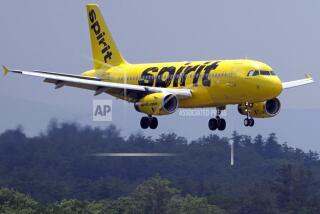TWA to File for ’92 Bankruptcy in Creditor Plan
- Share via
NEW YORK — Following the path of other troubled carriers, Trans World Airlines said Tuesday that it will file for bankruptcy early next year as part of a plan designed to ensure the company’s long-term survival.
TWA, which like many of the nation’s airlines that have been hurt by the recession and the Persian Gulf crisis, will become the fifth major U.S. airline to seek bankruptcy protection this year.
The plan, which has the blessing of TWA’s creditors, would cut $1 billion from the carrier’s substantial debt. In return, TWA Chairman Carl C. Icahn, who owns about 90% of the airline, would hand over to the creditors a large stake in the company.
“There will be absolutely no impact on our operations or our scheduled service,” Mark Buckstein, TWA’s general counsel, said in an interview. “In fact, this action will strengthen TWA by allowing it to avoid all of the problems with its creditors, which have been so well publicized in the last year.”
Buckstein said that the reorganization and bankruptcy under Chapter 11 of the federal bankruptcy code will bolster TWA’s current bid for bankrupt Pan American World Airways, despite industrywide expectations that rival bidder Delta Air Lines will succeed. “We will go after Pan Am very aggressively,” he said.
TWA--which was founded in 1928 and was for many years owned by the reclusive Howard Hughes--will join the ranks of Pan Am, Continental Airlines, Midway Airlines and America West Airlines in bankruptcy court. Additionally, Eastern Airlines, which languished in bankruptcy for two years, liquidated earlier this year.
TWA will pursue a somewhat novel form of bankruptcy--called a “pre-packaged bankruptcy”--that has grown increasingly popular in recent months. Unlike most bankruptcies, TWA and its creditors have already reached an agreement as to how the company will emerge from court. Such plans are then promptly approved by the bankruptcy court.
Under the reorganization plan, TWA will be left with $400 million in cash, including $35 million personally committed by Icahn. TWA said it would emerge from bankruptcy in between 60 and 90 days after the filing.
After the deal is complete, Icahn’s stake in the company will be reduced to between 20% to 45%.
“Although these negotiations have been complicated,” Icahn said in a prepared statement, “I believe that the result will work to the best advantage of all our creditors and employees.”
Icahn assumed control of TWA in August, 1985, after a three-month battle for control. At that time, the TWA board warned that he was a known corporate raider and would sell off the airline piecemeal to turn a quick profit.
But Icahn assured them with numerous pledges and specific agreements with the TWA unions that this would not be the case.
“I’ve got to hand it to Carl Icahn,” said Scott Hamilton, editor of the Commercial Aviation Report, a Dallas-based newsletter specializing in aircraft financing. “He deserves a gold star for this one. He was able to wring concessions largely because in the current (airline) environment, the creditors and (airplane) lessors are faced with playing ball or watching their assets rust in the desert.”
But he added that TWA was “still far from being a healthy carrier.” It had $2.6 billion in long-term liabilities at the end of 1990 and posted substantial losses this year.
Thus, Hamilton predicted that TWA has a slim chance of taking over Pan Am. “The judge involved in the (Pan Am bankruptcy) case will be a lot more comfortable giving Pan Am to Delta than to TWA,” Hamilton said.
The TWA creditors appeared satisfied with the reorganization agreement. Jeremy Bloomer, the head of Connecticut-based Credit Research & Trading Corp., which acted as adviser to some of the TWA creditors, said the agreement will greatly simplify and shorten the reorganization.
More to Read
Inside the business of entertainment
The Wide Shot brings you news, analysis and insights on everything from streaming wars to production — and what it all means for the future.
You may occasionally receive promotional content from the Los Angeles Times.










